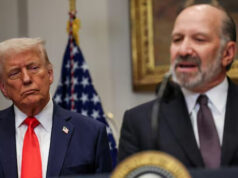The American administration led by outgoing President Joe Biden planned the regime change operation in Dhaka. And although there might be some change once Donald Trump returns to the White House, ‘the deed has been done.’
Ambassador Pinak Ranjan Chakravarty doesn’t mince his words. In this episode of The Gist, the veteran diplomat who’s served two stints in Dhaka categorically blamed the outgoing Biden administration for the situation in Bangladesh, which “clearly for India is not a happy situation.”
“In Most of our foreign policy projections we talk about a stable, peaceful, democratic periphery. That’s our vision, our goal, but sometimes I feel like calling it a pipe dream,” he said.
Having decided that Prime Minister Hasina needs to be ousted, Biden’s team planned this operation, and they have succeeded, he said. “The Americans sometimes do this regime change operation without giving much thought to the fallout, and this is what has happened in events all over the world,” he said, adding: “It’s not good for us, it’s not good for regional stability, and it’s bad for Bangladesh.”
How does having an Islamist party in power in Bangladesh help the U.S.?
The one thing that people tend to forget or ignore is that the Americans have been very close to the Islamist parties, particularly the Jaamat-e-Islami, “which was a collaborator with the Pakistan Army in 1971, and committed horrible atrocities” in what was then East Pakistan, the ambassador explained. “They were all together in it, the Americans, the Jaamatis, and China too was siding with Pakistan.”
According to ambassador Chakravarty, the Americans “have a long linkage with the Jaamat-e-Islami, and they have always justified it by saying that it’s better to deal with the overground Jaamat than rather than drive it underground.”
And this linkage was exploited during this regime change operation in Bangladesh, he said.
“For example, the Shibir, or the youth wing of the Jaamat, or their storm troopers, they were on the field, and they took over the students’ agitation, which was genuine to begin with.”
The reason why the Bangladesh Nationalist Party — which had boycotted elections after the 2008 parliamentary polls, allowing the Awami League regime led by Sheikh Hasina to continue uninterrupted in power since then —could be pushing for early elections because the Awami League is in disarray. But the students who now hold the reins of power are probably delaying for reforms and perhaps in the hope of forging a party of their own, which could legally contest the elections, he felt.
“The violence and attacks on minorities that are still going on have only further vitiated the atmosphere, “ he felt.
To get deeper insights into the situation in Bangladesh, the forces at play and what it could mean for India, and whether or not India was right to have helped liberate Bangladesh in the first place, watch the full interview.
In a career spanning three decades and counting, Ramananda (Ram to his friends) has been the foreign editor of The Telegraph, Outlook Magazine and the New Indian Express. He helped set up rediff.com’s editorial operations in San Jose and New York, helmed sify.com, and was the founder editor of India.com.
His work has featured in national and international publications like the Al Jazeera Centre for Studies, Global Times and Ashahi Shimbun. But his one constant over all these years, he says, has been the attempt to understand rising India’s place in the world.
He can rustle up a mean salad, his oil-less pepper chicken is to die for, and all it takes is some beer and rhythm and blues to rock his soul.
Talk to him about foreign and strategic affairs, media, South Asia, China, and of course India.




